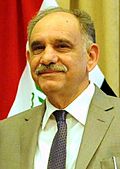Iraqi parliamentary election, 2014
|
|
|||||||||||||||||||||||||||||||||||||||||||||||||||||||||||||||||||||||||||||||||||||||||||||||||||||
|---|---|---|---|---|---|---|---|---|---|---|---|---|---|---|---|---|---|---|---|---|---|---|---|---|---|---|---|---|---|---|---|---|---|---|---|---|---|---|---|---|---|---|---|---|---|---|---|---|---|---|---|---|---|---|---|---|---|---|---|---|---|---|---|---|---|---|---|---|---|---|---|---|---|---|---|---|---|---|---|---|---|---|---|---|---|---|---|---|---|---|---|---|---|---|---|---|---|---|---|---|---|
|
|||||||||||||||||||||||||||||||||||||||||||||||||||||||||||||||||||||||||||||||||||||||||||||||||||||
|
All 328 seats to the Council of Representatives 165 seats needed for a majority |
|||||||||||||||||||||||||||||||||||||||||||||||||||||||||||||||||||||||||||||||||||||||||||||||||||||
| Turnout | 62% | ||||||||||||||||||||||||||||||||||||||||||||||||||||||||||||||||||||||||||||||||||||||||||||||||||||
|
|||||||||||||||||||||||||||||||||||||||||||||||||||||||||||||||||||||||||||||||||||||||||||||||||||||

Colours denote which party won the most votes in every governorate
|
|||||||||||||||||||||||||||||||||||||||||||||||||||||||||||||||||||||||||||||||||||||||||||||||||||||
|
|||||||||||||||||||||||||||||||||||||||||||||||||||||||||||||||||||||||||||||||||||||||||||||||||||||
Nouri al-Maliki
State of Law Coalition
Haidar al-Abadi
State of Law Coalition
Parliamentary elections were held in Iraq on 30 April 2014. The elections decided the 328 members of the Council of Representatives who will in turn elect the Iraqi President and Prime Minister.
The open list form of party-list proportional representation, using the governorates as the constituencies, is the electoral system used. The counting system has been changed slightly from the largest remainder method to the modified Sainte-Laguë method due to a ruling by the Supreme Court of Iraq that the previous method discriminated against smaller parties. Seven "compensatory" seats that were awarded at the national level to those parties whose national share of the vote wasn't reflected in the seats won at the governorate level have been allocated to individual governorates. Eight seats remain reserved for minority groups at the national level: five for Assyrians and one each for Mandaeans, Yezidis, and Shabaks.
Prior to the elections, the parliament decided to expand from 325 to 328. As with the 2010 elections, 8 seats were reserved for ethnic and religious minorities. Unlike previous elections, there were no compensatory seats; reserved seats that previously favorited big-time parties.
...
Wikipedia








